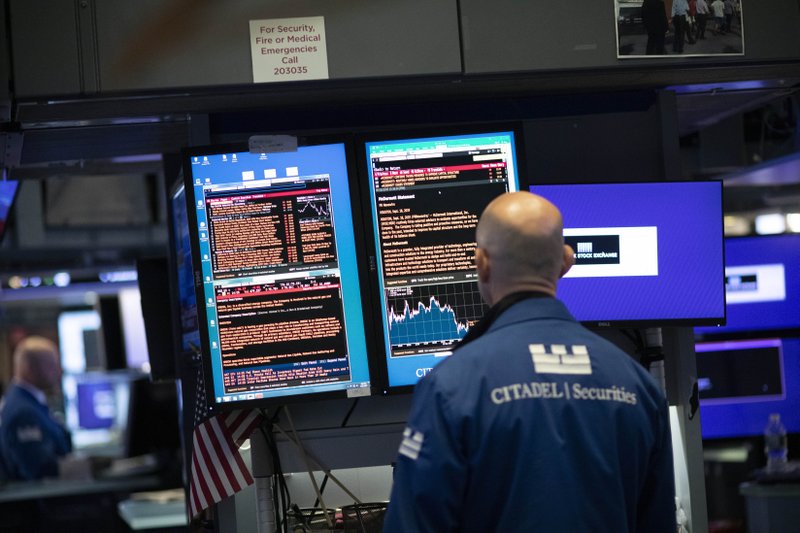U.S. stocks sank to their worst loss in five weeks on Tuesday after a surprisingly limp report on the nation’s manufacturing stirred worries about the economy’s strength.
The report showed that manufacturing weakened in September for the second straight month as President Donald Trump’s trade war with China dragged on confidence and factory activity. It dashed economists’ expectations that August’s contraction had been an aberration, and stocks and bond yields immediately reversed course to drop sharply lower following the report.
The S&P 500 slumped 36.49 points, or 1.2%, to 2,940.25 for its sharpest loss since August. The Dow Jones Industrial Average fell 343.79, or 1.3%, to 26,573.04, and the Nasdaq composite dropped 90.65, or 1.1%, to 7,908.68.
Small-company stocks fell more than the rest of the market. The Russell 2000 index lost 29.94 points, or 2%, to 1,493.43.
In the bond market, the yield on the 10-year Treasury dropped to 1.63% from 1.74% before the report’s release, which is a big move. Three stocks fell for every one that rose on the New York Stock Exchange, and gold climbed as investors sought safer ground.
The market had been gliding gently upward at the day’s start, and the S&P 500 was up as much as 0.5% within the first half hour of trading. But then the report from the Institute for Supply Management hit, showing its manufacturing index was at 47.8 last month, the lowest since 2009. Any reading below 50 indicates a contraction.
Economists had been expecting growth to resume in September, and they had forecast a reading of 50.4, according to FactSet.
Manufacturers say global trade remains the most significant issue, and all the uncertainty caused by the trade war is hurting exporters in particular. Businesses are unsure what the rules of international trade will be, and it’s causing CEOs to pull back on their spending plans. In a separate report, the World Trade Organization said global trade growth will slow to its weakest pace this year since 2009.
“The disappointing data is only fanning long-standing fears of slowing global growth,” said Alec Young, managing director of Global Markets Research at FTSE Russell.
Manufacturing is a relatively small part of the economy, but investors worry about whether it will spill into other areas. That puts an even bigger spotlight on Friday’s jobs report, which economists expect to show an acceleration in hiring.
Household spending has been a pillar for the economy, particularly when manufacturing and business spending are under threat, and a strong job market helps households keep spending. But uncertainty is looming even there.
A report last week showed that consumer spending rose less than economists expected in August. Two reports on consumer confidence last week gave a mixed picture, with one falling below expectations and the other rising above.
Last month’s jobs report was also surprisingly weak, but that may have been a one-off, some analysts say.
“The month of August over the last 10 years has been the wonkiest jobs report of the year,” said Philip Orlando, chief equity market strategist at Federated Investors. It often falls below expectations, only for the numbers to be revised higher in subsequent months, he said.
“There’s no question the data has been softer, slower, weaker, pick your adjective for today versus a year ago,” Orlando said about the broad economy. “But I do think we’re going to get through this.”
Following the weak manufacturing report, investors ratcheted up expectations for the Federal Reserve to come to the economy’s aid. They increasingly believe the Fed will cut interest rates by half a percentage point at its meeting later this month, rather than the quarter point they were forecasting a day earlier.
The Fed and other central banks around the world have been aggressive in keeping rates low to shield against the effects of the trade war and slowing global economic growth. The Fed lowered short-term rates twice this summer, down to a range of 1.75% to 2%, the first cuts since the financial crisis was toppling economies around the world in 2008.
Financial stocks were among the market’s biggest losers Tuesday, hurt by the drop in interest rates, which can crimp the profits banks made from lending.
Charles Schwab also upended the industry when it said it will eliminate mobile and web trading commissions for stocks, exchange-traded funds and options listed in the United States and Canada. It’s the latest move in an industrywide pricing war that’s dramatically cut the cost of investing.
Schwab fell 9.7% after the announcement, but rivals sank even more. TD Ameritrade lost 25.8%, and ETrade Financial dropped 16.4% for the biggest loss in the S&P 500.
In European stock markets, the CAC 40 in France fell 1.4%, Germany’s DAX lost 1.3% and the FTSE 100 slipped 0.6%. In Asia, Japan’s Nikkei 225 rose 0.6%, and South Korea’s Kospi gained 0.5%.
Benchmark crude oil fell 45 cents to settle at $53.62 a barrel. Brent crude oil, the international standard, fell 36 cents to close at $58.89 a barrel. Wholesale gasoline was unchanged at $1.57 per gallon. Heating oil was unchanged at $1.90 per gallon. Natural gas fell 5 cents to $2.28 per 1,000 cubic feet.
Gold rose $16.30 to $1,482.00 per ounce, silver rose 30 cents to $17.20 per ounce and copper fell 1 cent to $2.55 per pound.
The dollar fell to 107.73 Japanese yen from 108.07 yen on Monday. The euro strengthened to $1.0936 from $1.0902.
(AP)












One Response
Once again our strong economy is hampered by a neurotic xenophobic president who has sabotaged our wellbeing by declaring a baseless and wasteful trade war with one of our closest trade allies. This fact does not surprise me, but what does surprise me is that this same tyrant has recently declared that he and his party of nutjobs have raised 464 MILLION DOLLARS. How can you raise so much money while promoting a failing agenda and running a demented party?